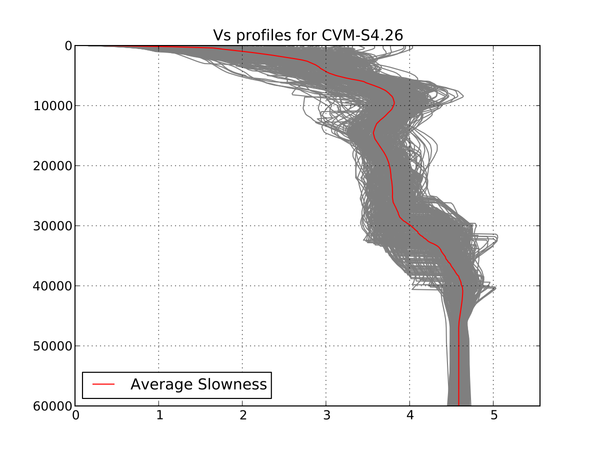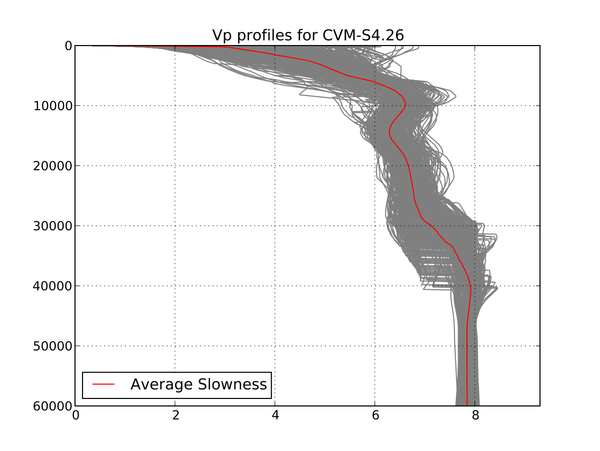CVM-S4.26.M01 Proposed Final Model
Contents
Description
The CVM-S4.26 proposed final model is an effort to integrate Po's perturbations while still honoring the CVM-S4 GTL. The desired effect is that we recover the CVM-S GTL while smoothly adding in positive and negative perturbations.
Presently, we have three possible options:
1. Apply positive perturbations to the base model within the basin, and apply negative perturbations but no lower than base model Vs. Apply both positive and negative perturbations to the starting model outside of the basin.
2. Applying negative perturbations only if outside the basin and always applying positive perturbations even if inside the basin - to the starting model.
3. Same as 2. but disregard positive perturbations inside the basin - to the starting model.
Option 1 is currently the proposed final idea for the final CVM-S4.26 model, although we are evaluating each idea using 3D wave propagation simulations.
Proposed Final Model CyberShake Region Plots (including taper at 50km)
Definition of Terms
- Base Model - CVM-S4 material properties as delivered by CVM-S4
- Starting Model for Inversion - CVM-S4 material properties with min Vs=1000m/s
- Final Model with Inversion - CVM-S4 with Perturbations
When describing each proposal for implementing these perturbations, we use the following terms:
BASE Vp, Vs, Rho = CVM-S4 material properties
STARTING Vp, Vs, Rho = Po and En-Jui's starting model from which all the iterations were derived
FINAL Vp, Vs, Rho = Returned material properties
PERTURBATION Vp, Vs, Rho = Po and En-Jui's 26th iteration of perturbations
In the basin
The term "in the basin" is used frequently when discussing the various options for smoothly combining Po's perturbations with the SCEC base model.
In the basin can mean two things:
1) The area of the model in which Vs < 1000m/s.
2) The area of the model in which Po's starting model is different from the base CVM-S4 model. Po's model makes the material stiffer for areas in which Vs < 1500m/s, Vp < 3000m/s, and/or density < 2300.
For option 1, we use the first definition (Vs < 1000m/s). For options 2 and 3, we use the second definition.
Algorithms and Plots
Option 1
Plots of option 1.
This option is currently the version being proposed as the final CVM-S4.26 model.
It combines Po and En-Jui's perturbations with the starting model in the following manner:
The proposed final model incorporates the 26th iteration in the following manner:
IF BASE Vs < 1000m/s THEN
IF BASE Vs + PERTURBATION Vs < BASE Vs THEN
FINAL Vp = BASE Vp
FINAL Vs = BASE Vs
FINAL Rho = BASE Rho
ELSE
FINAL Vp = BASE Vp + PERTURBATION Vp
FINAL Vs = BASE Vs + PERTURBATION Vs
FINAL Rho = BASE Rho
IF FINAL Vp / FINAL Vs < 1.45 THEN
FINAL Vp = FINAL Vs * 1.45
END IF
END IF
ELSE
FINAL Vp = STARTING Vp + PERTURBATION Vp
FINAL Vs = STARTING Vs + PERTURBATION Vs
FINAL Rho = STARTING Rho
END IF
RETURN FINAL Vp, Vs, Rho
Option 2
Plots of option 2.
Algorithm:
IF (BASE Vs < STARTING Vs AND PERTURBATION Vs < 0) OR (BASE Vs > STARTING Vs AND PERTURBATION Vs > 0) THEN
// Quick comment: As per the algorithm, for regions outside of the basin, STARTING Vs = BASE Vs, so this doesn't trigger.
FINAL Vs = BASE Vs
ELSE
FINAL Vs = STARTING Vs + PERTURBATION Vs
END IF
IF (BASE Vp < STARTING Vp AND PERTURBATION Vp < 0) OR (BASE Vp > STARTING Vp AND PERTURBATION Vp > 0) THEN
// Quick comment: As per the algorithm, for regions outside of the basin, STARTING Vp = BASE Vp, so this doesn't trigger.
FINAL Vp = BASE Vp
ELSE
FINAL Vp = STARTING Vp + PERTURBATION Vp
END IF
FINAL Rho = STARTING Rho
IF FINAL Vp / FINAL Vs < 1.45 THEN
FINAL Vp = FINAL Vs * 1.45
END IF
Option 3
Plots of option 3.
Algorithm:
IF BASE Vs < STARTING Vs THEN
// Quick comment: As per the algorithm, for regions outside of the basin, STARTING Vs = BASE Vs, so this doesn't trigger.
FINAL Vs = BASE Vs
ELSE
FINAL Vs = STARTING Vs + PERTURBATION Vs
END IF
IF BASE Vp < STARTING Vp THEN
// Quick comment: As per the algorithm, for regions outside of the basin, STARTING Vp = BASE Vp, so this doesn't trigger.
FINAL Vp = BASE Vp
ELSE
FINAL Vp = STARTING Vp + PERTURBATION Vp
END IF
FINAL Rho = STARTING Rho
IF FINAL Vp / FINAL Vs < 1.45 THEN
FINAL Vp = FINAL Vs * 1.45
END IF
Base Model Plots
Plots of base model
Po's Starting Model Algorithm
The starting model is the one that Po and En-Jui used to begin their inversions. It is as follows:
LET CORNER Vp = 3000
LET CORNER Vs = 1500
LET CORNER Rho = 2300
LET MINIMUM Vp = 2000
LET MINIMUM Vs = 1000
LET MINIMUM Rho = 2000
LET BASE_MINIMUM Vs = 100
LET BASE_MINIMUM Vp = 283.637
LET BASE_MINIMUM Rho = 1909.786
LET STARTING Vp = BASE Vp
LET STARTING Vs = BASE Vs
LET STARTING Rho = BASE Rho
IF STARTING Vs < BASE_MINIMUM Vs THEN
STARTING Vs = BASE_MINIMUM Vs
END IF
IF STARTING Vp < BASE_MINIMUM Vp THEN
STARTING Vp = BASE_MINIMUM Vp
END IF
IF STARTING Rho < BASE_MINIMUM Rho THEN
STARTING Rho = BASE_MINIMUM Rho
END IF
IF STARTING Vp < CORNER Vp THEN
STARTING Vp = (CORNER Vp * (MINIMUM Vp - BASE_MINIMUM Vp) + STARTING Vp * (CORNER Vp - MINIMUM Vp)) / (CORNER Vp - BASE_MINIMUM Vp)
END IF
IF STARTING Vs < CORNER Vs THEN
STARTING Vs = (CORNER Vs * (MINIMUM Vs - BASE_MINIMUM Vs) + STARTING Vs * (CORNER Vs - MINIMUM Vs)) / (CORNER Vs - BASE_MINIMUM Vs)
END IF
IF STARTING Rho < CORNER Rho THEN
STARTING Rho = (CORNER Rho * (MINIMUM Rho - BASE_MINIMUM Rho) + STARTING Rho * (CORNER Rho - MINIMUM Rho)) / (CORNER Rho - BASE_MINIMUM Rho)
END IF
IF STARTING Vp / STARTING Vs < 1.45 THEN
STARTING Vs = STARTING Vp / 1.45
END IF
RETURN STARTING Vp, Vs, and Rho
Vs Examples
Below is a chart of CVM-S4 Vs values and how those would be represented in the starting model.
| CVM-S4 Vs | Starting Model Vs |
|---|---|
| 100m/s | 1000m/s |
| 200m/s | 1036m/s |
| 300m/s | 1071m/s |
| 400m/s | 1107m/s |
| 500m/s | 1142m/s |
| 600m/s | 1179m/s |
| 700m/s | 1214m/s |
| 800m/s | 1250m/s |
| 900m/s | 1286m/s |
| 1000m/s | 1321m/s |
| 1100m/s | 1357m/s |
| 1200m/s | 1393m/s |
| 1300m/s | 1429m/s |
| 1400m/s | 1464m/s |
| 1500m/s | 1500m/s |

